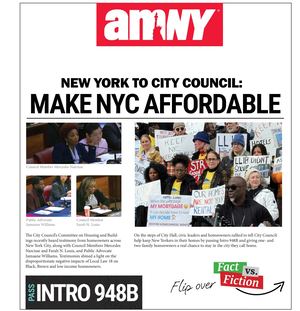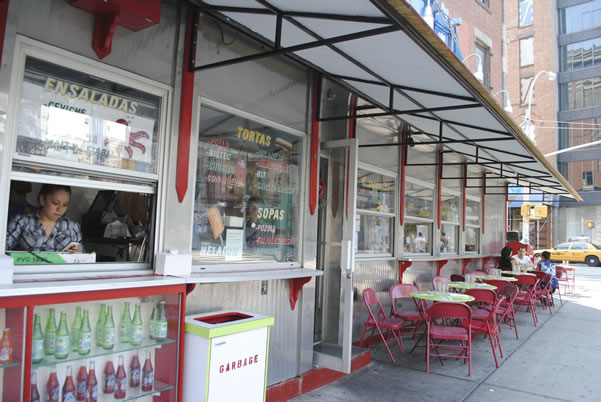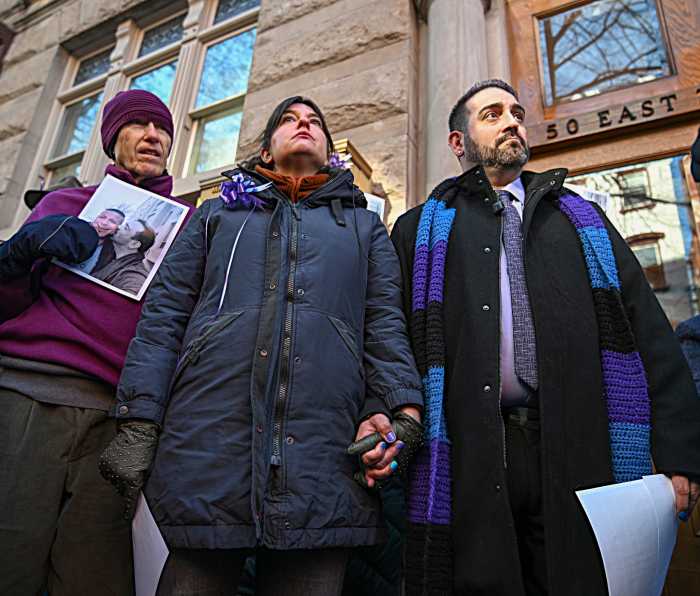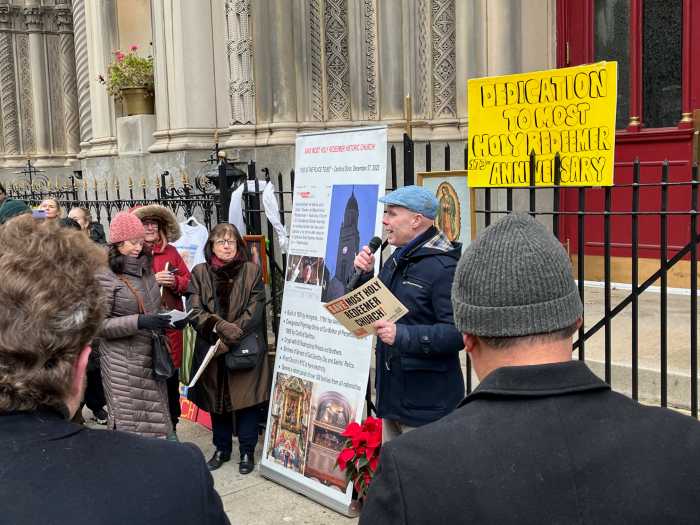By Aidan Gardiner
At a recent Community Board 2 meeting, local residents railed against chic Nolita hot spot La Esquina in an effort to stymie its owners’ efforts to get the blessing of the board to renew its liquor license. Some attendees denounced the restaurant and its owners, highlighting the ongoing tensions between the community and the hip eatery.
La Esquina (Spanish for “the corner”) on Kenmare St. sandwiched between Lafayette St. and Cleveland Place, is at once a grab-and-go taqueria, a restaurant and an exclusive lounge that has served young night crawlers since 2005. Its owners have indicated a willingness to mend the rift with their neighbors, but opponents seem to be steadfastly against the restaurant as long as it continues to operate as it does.
At last month’s C.B. 2 S.L.A. Licensing Committee meeting, Georgette Fleischer, founder of Friends of Petrosino Square and longtime La Esquina opponent, recited a long list of grievances with the establishment. These included a city-issued vacate order from May 2010 for its speakeasy-style, 284-person basement space that is accessed through a kitchen, then via a narrow staircase. The place has also been hit with numerous complaints over a period of several years for noisy outdoor events, sometimes sporting large TV screens.
Tobi Bergman, a C.B. 2 member who spoke critically of La Esquina at the committee meeting, bemoaned in a later interview the large crowds that the restaurant attracts.
“They are generally very noisy and discourteous,” Bergman said. “It is effectively a private taking of public space.”
Derek Sanders, a part owner of La Esquina who attended the meeting, downplayed the amount of community opposition and said that he and others associated with La Esquina are working to patch things up between the trendy nightspot and community members.
“For us, it’s always been the same thing: We play by the rules and do everything right, and then two or three people stand up and start making up stuff,” Sanders said. “We’re going in a different direction. We’re reaching out to C.B. 2, reaching out to the City Council, and saying, ‘We’re here. We’ve done anything you’ve ever asked. What can we do to help make this better?’ ”
Fleischer disputed Sanders’s characterization of the opposition as a minority of neighbors, citing the several others who spoke out against the restaurant at the June committee meeting, the C.B. 2 members’ 7-to-0 vote against it, and the many signatures that she collected around her neighborhood on a petition that criticized La Esquina.
The committee unanimously approved the recommendation that the State Liquor Authority deny the restaurant’s request to renew its liquor license. Their resolution noted the “sheer cumulative number of citations and community complaints” against La Esquina and the owners’ unwillingness to address them as reason to recommend sinking it.
At C.B. 2’s subsequent June meeting, the full board voted to support the committee’s resolution and deny the liquor license renewal.
Losing its liquor license, could have been a deathblow for the Nolita nightspot. However, community board resolutions are advisory only.
More to the point, the board’s recommendation was moot: Only a month prior, the S.L.A. had renewed the embattled restaurant’s liquor license until 2013.
On July 18, Sanders met with members of Councilmember Margaret Chin’s Office, who suggested that representatives of the restaurant meet with C.B. 2 and various community members.
Along with regular meetings, Chin’s staff also suggested documenting the times when La Esquina opens and closes.
“I commend La Esquina for arranging a meeting with my office to discuss how they can do more to reach out to the surrounding community,” Chin said. “I think this is great progress.”
Sanders indicated that many of the problems facing his restaurant stem from its lack of presence in the community aside from being a perceived nuisance.
“We’re going to try to set up that dialogue so that it’s helpful to the neighbors and constructive for everybody,” he said.
But Fleischer doesn’t think that such meetings would help, and said that she isn’t interested in attending because she feels that the owners consistently harass her. She said that one of La Esquina’s attorneys regularly singles her out in community board meetings.
Fleischer also said that the legions of supporters that the restaurant draws send her vicious hate mail because she’s its most vocal opponent.
Last year, days after the Department of Buildings temporarily shuttered La Esquina for an inadequate egress to its cellar bar with “combustible” ceilings, a Twitter user with the handle “@ramonabean” posted, F— YOU Georgette Fleischer FOR CLOSING LA ESQUINA!!! LET THE F— YOU EMAIL PARTY COMMENCE,” and then listed Fleischer’s phone number and e-mail address. Today, @ramonabean has more than 1,000 followers, and at least 12 others retweeted the same message to their own followers.
According to S.L.A. spokesperson Bill Crowley, the authority would not renew an establishment’s liquor license if noise complaints lodged against it were persistent and if it was being a “bad neighbor.”
Those criteria would appear to be in lockstep with C.B. 2’s criticisms of La Esquina. Yet Crowley agreed with Sanders’s assessment of the restaurant’s opposition and said that the authority still didn’t have enough reason to stop the liquor license from being extended.
Crowley characterized liquor license renewals as purely administrative: Establishments need only apply for renewal to be renewed, and generally aren’t subject to rigorous review unless flagged for egregious violations.
If the complaints are sufficiently serious, then the authority would launch a formal investigation, as it did in 2010 when it ordered La Esquina to pay $7,500 for numerous violations.
Crowley also said that the S.L.A. can’t take into account those past violations that were brought up at C.B. 2 because the restaurant already paid those fines, and for the S.L.A. to do so would effectively undermine the authority’s prior judicial decision.
He also said that many of the anecdotal complaints community members cited were insufficient.
“We need concrete information to act on,” the spokesperson said. “We can’t just have complaints coming in right before their renewal period. People make a career out of complaining.”





































